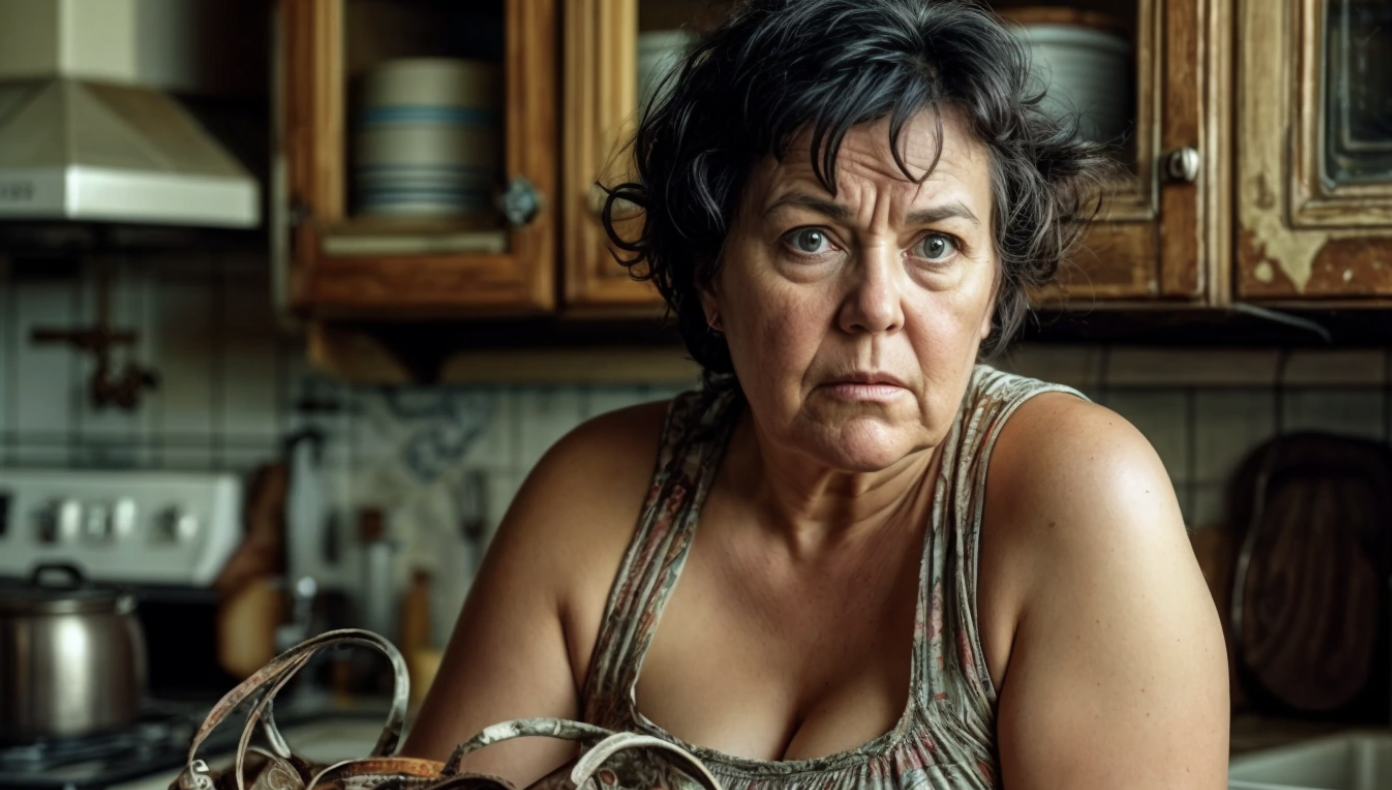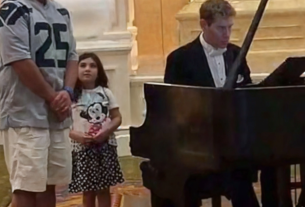Igor turned 33—a milestone age when some are already managing production, others going through divorces, and still others continuing to live by the rules set back in the eighth grade by a strict mother.
Igor had grown accustomed to being the “good son.” Whenever he heard the word “independence,” he didn’t think of a mortgage but instead nervously recalled the time when his mother tore up his notebook because the numbers in it were “dancing.”
Galina Viktorovna raised her children on her own. Her husband left when Igor was ten, and ever since, three things had firmly taken root in the household: thrift, total oversight, and the lingering aroma of sauerkraut soup.
Every penny Igor earned in his youth he handed over to his mother. At first it seemed logical: “Who else, if not her?” Then it became a habit. Eventually, he stopped even thinking about it. When his salary came in—he transferred it. Wanted to buy a watch? He discussed it with his mother. Craving a laptop? He received approval for buying a computer for his niece.
The main problem was that it all felt normal to him.
He wasn’t a coward. He had simply grown up in a system where a mother’s opinion was considered the ultimate truth, and agreeing with her was the only way to survive.
Then Yulia entered Igor’s life, and everything started to shake.
She was different. Bold. Vibrant. She could laugh heartily, order a 350-ruble coffee without an iota of guilt, and declare phrases like:
“If I want that dress, I’m going to get it. And no one can talk me out of it.”
At first, Igor was flustered; then he fell in love. And he married her.
Galina Viktorovna carried herself with dignity at the wedding. Only once, noticing that Yulia had worn white open-toed sandals, did she hiss in her son’s ear:
“Wedding isn’t a beach. Couldn’t you have chosen proper shoes?”
That was the moment when everything began.
Yulia loved to live beautifully. She had her own job and income, as well as her own habits. She didn’t save for three years to buy wallpaper. She got a manicure and didn’t apologize for it. She craved a life where gifts were given out of genuine desire, not duty.
Galina Viktorovna, on the other hand, saw this as a catastrophe for the family budget. Every expense Yulia made brought an expression to her face as if her bank account had just taken a hit.
“Did she order food again? Is that your wife or a sponsor for the delivery service?”
“Those are earrings? Why, you just gave her a ring!”
“A new phone? Meanwhile, your sister is out there with a cracked screen.”
As always, Igor tried to “keep the peace.”
He agreed with his wife at the store and with his mother in the kitchen. He transferred money to his sister “while Yulia wasn’t looking” and only bought gifts for Yulia after sending the “mandatory contributions” to the “Ministry of Finance named after Galina Viktorovna.”
He didn’t feel controlled. Rather, he considered himself a mediator in conflict resolution.
At first, Yulia laughed. Then she became angry. Then she began to collect— not money, but arguments.
And his mother continued to do what she had always done: reminding him who in the family “devoted their life to you” and who “had real needs, not just rags.”
Igor found himself caught between them, like an old doormat in the hallway: both walked all over him, yet no one bothered to clean him.
He didn’t complain. He believed that this was just how things should be.
Until one day, Yulia desired a handbag.
And his mother found yet another reason to assert her claim on her son.
And everything that had seemed so routine suddenly began to crumble.
It all started quite innocently.
Yulia sat down next to Igor on the sofa, rested her head on his shoulder, and almost in a whisper said:
“Listen, I saw the most stunning handbag…”
“Uh-huh,” Igor replied, still lost in his news feed.
“Small, leather, with golden fittings. Simply exquisite.”
Igor felt his back tense. The words “stunning handbag” instantly activated an alarm in his mind: “Now I’ll have to explain to mother why the money went to the wrong place again.”
“How much does it cost?” he inquired, still hoping to hear something like “just four thousand, and maybe they’ll throw in a key holder as a gift.”
“Thirty.”
“Rubles?”
“Yes, Igor, not euros. It’s a designer item.”
Igor exhaled loudly.
“Yulia… you do realize, right? Mom asked to help my niece with the garden…”
“Here we go again,” she interrupted, pulling away. “‘Sister,’ ‘garden,’ ‘mother ordered.’”
“I’m just saying…”
“You’re last on my list. After your mother, after your sister, after the budget for borscht and car repairs. I’ve made myself clear.”
Then, with a demonstrative slam of the kitchen door, she left. Without yelling, but with an unmistakable hint.
He sat for about five minutes, feeling as if the walls of the room were closing in on him. Then he got up, took his phone, and— like a hero of passive protest— placed an order for that very handbag.
For their anniversary. In an elegant box. With a bow.
The celebratory dinner began… surprisingly calmly.
Yulia, radiant, in a dress that screamed “Today is my special day, even if no one notices.”
Galina Viktorovna, in her favorite blouse, as if saying, “I just dropped by, but I’m determined to ruin your celebration.”
Sister Ksenia with her husband— silent, like those who have learned over the years to survive next to Galina Viktorovna.
And then came the moment of truth.
Yulia stood up and, beaming radiantly, showcased the gift:
“Here’s my proud trophy! A gift from Igor—the most wonderful husband in the world!”
The handbag was indeed magnificent. Elegant, stylish, with gleaming fittings and an aura that heralded a crisis in the family hierarchy.
Galina Viktorovna froze. Then took a deep breath. After exhaling, she opened her mouth and began her attack.
“Your fashionista is going to manage just fine without that 30,000-ruble handbag,” she declared in a tone that was usually reserved for announcing a verdict. “Return it and give the money to your sister for her child. At least it will be of use, not just a showpiece.”
Silence fell over the table. The kind of silence that precedes a storm.
Yulia froze with her glass in hand.
Igor stared at his salad, as if among the greens there might be an escape from this situation.
His sister put down her fork. Her husband buried his head in his shoulders.
“What did you say?” Yulia quietly asked, looking at him.
“I said: it’s all right. You can’t show off with your salary like that, honestly. Money should be invested in the family, not spent on nonsense. Our Katya can’t even join a class, while you parade around with expensive accessories.”
Yulia paled.
“Igor, do you think this is normal?” she asked, staring at him intently.
He continued to examine his salad.
Because it turned out that a man, used to living between two women, could even hide within an Olivier salad.
“Are you going to remain silent? Seriously?”
He wanted to say something— honestly. But his tongue was paralyzed by fear.
Yulia set down her glass.
“Fine. Have a nice evening.”
After dinner, a deathly silence settled over the apartment.
Only the handbag, in its elegant box, stood as a symbol of the impending crisis.
After that incident with the handbag, life seemed to return to its usual course.
Yulia no longer initiated discussions about shopping, and Galina Viktorovna ceased hiding her disdain.
They no longer faced each other directly—instead, a cold, tense atmosphere settled in the apartment.
Igor, as always, tried not to notice. He was used to waiting out the storm.
Only this time, the situation wasn’t improving.
Mother began calling more often. Sometimes— just because. Sometimes—with less gentle reasons.
“Son, didn’t you get your salary today?”
“I did,” he answered cautiously.
“Well, Ksenia’s in trouble. They won’t let Katya join classes unless we pay extra for the uniform. And Sasha has laryngitis again. Can’t you help a little? I’m not asking for myself. It’s for the family.”
The word “family” Galina Viktorovna pronounced with such force that Igor’s left eye began to twitch. He nodded. Transferred money. Tried not to tell Yulia.
But Yulia wasn’t stupid.
“Did you send money to your mom again?” she once asked when he quickly hid his phone.
“Not to her. To my sister.”
“Of course, she’s also being supported by us.”
Igor remained silent.
Yulia sighed heavily.
“I’m not against you supporting the family. But now you belong to a different family. You’re my husband.”
“What am I supposed to do?” he exploded. “My sister is in debt, my mother is alone, and you—with your complaints. Am I even a person or just a walking wallet?”
“Right now, you’re a wallet. But even a wallet has a zipper. You don’t.”
He headed to the kitchen. She—to the bedroom.
The doors closed almost simultaneously.
After a while, he began to notice that in their family no one spoke openly. Everyone communicated through hints.
Yulia would attach sticky notes to the fridge:
“Don’t forget: your wife isn’t just an add-on to the family budget.”
And mother would text:
“Neighbor’s Andrey just renovated. And you can’t even help set up a corner for Katya. Apparently, escorting your wife around shopping malls is more important.”
Igor tried to remain neutral, like Switzerland. But, like Switzerland, he had his hidden accounts.
One day he overheard Yulia talking on the phone with a friend:
“Yes, he’s kind. Too kind. Really… accommodating. If only he were a bit tougher—maybe things would be different. But for now—he’s a good boy with a good mother. It’s just that I seem to be the odd one out. But as long as he pays the mortgage—let him be.”
He froze by the door. His heart clenched—not out of anger, but realization.
Later, he accidentally overheard his mother talking with his sister:
“I’m keeping him, don’t worry. As long as he listens to me and not his wife, I can squeeze money out of him for repairs, for a refrigerator. And then we’ll see. The main thing is that Yulia doesn’t start bossing him around.”
He didn’t even go in. He closed the door and sat right on the landing. He sat for about ten minutes.
Then he stepped outside—just to take a walk.
Because for the first time in 33 years, he felt not like a son or a husband—but like an instrument.
A wallet with two owners. One with his wife. The other with his mother.
That night he didn’t sleep. Not from anxiety. But from… silence. True silence. Without the oppressive voices in his head. He understood that things would not be easy moving forward.
Mother—she wouldn’t forget. Yulia—she wouldn’t forgive right away.
But for the first time, he wasn’t trying to please everyone. He wasn’t conforming. He wasn’t giving in.
The next morning, as he stirred his water (not coffee) quietly at the table, Igor spoke:
“Invite my mother over.”
Yulia turned:
“Why all of a sudden?”
He said nothing, but Yulia unexpectedly chose not to argue.
She dialed the number. In twenty minutes, Galina Viktorovna was sitting in their kitchen, as if she had come to preside over a governmental meeting.
“What’s this? A meeting?” she asked, casting a glance at her son.
Igor placed a cup before him. Just water. No sugar. Plain—like himself, unadorned, but clean.
“Mom. Yulia. Listen to me.”
Both froze. They’d never heard him begin like this before.
“I’m not going to live the way I used to anymore. I’m not going to coordinate my purchases, decisions, expenses—not because I’m a bad husband or a bad son, but because I’m an adult.”
He spoke calmly. Not aggressively, not forcefully. Simply—confidently. And in the first person.
A rarity—even for him.
“I’m tired. Tired of being a source of income rather than an individual. Tired of everyone coming to me with requests as if I were an ATM, yet no one cares about how much remains in my account. Not in rubles—but in respect.”
Yulia wanted to say something, but he raised his hand.
“Wait. Let me finish. This isn’t about blame. It’s about boundaries.”
He shifted his gaze to his mother.
“Mom, I’m grateful to you. Truly—for everything you did when I was eight, ten, fifteen.
But now I’m 33. I’m not your project. I’m not your interest-bearing tab.
I am your son. But I am not obliged to be the embodiment of righteousness, discipline, and the regular remittance of funds onto your card.”
Galina Viktorovna’s expression darkened.
“Igor, you’re speaking like a completely different person.”
“No, I’m speaking as someone who has finally found his voice. You want me to help Ksenia? Fine. Sometimes—I’ll do it, voluntarily. But not by command. You want me to support you? I will, but not at the expense of my own family.”
Yulia looked at him as if she were meeting a new person.
Igor continued:
“And you, Yulia. I’m sorry, but you’re not blameless either. You claim that I’m weak. Perhaps. But I didn’t become this way on my own. Both of you made me convenient, and then started to criticize me for not being a leader. So from today on, I’m no longer yours. I’m my own. And if someone doesn’t like that—it’s no longer my problem.”
Silence stretched out, as if the world around them were rebooting.
Galina Viktorovna stood up.
“Understood. So now I’m nobody? You two decide everything. Fine—live your lives.”
“We are living, Mom. And you live too. Just—without controlling my life.”
She left. Without slamming doors. Almost silently.
Yulia remained seated.
“Seriously?”
“Yes.”
She came over, embraced him—not tightly, not passionately, just sincerely.
“I’ve never met an Igor like this.”
“I just got to know him.”
That night Igor did not sleep. But not from anxiety— from… silence. Real silence. Without the oppressive voices in his head. He understood that the road ahead would be difficult.
Mom—she wouldn’t forget. Yulia—she wouldn’t forgive immediately.
But for the first time, he wasn’t trying to please everyone. He wasn’t conforming. He wasn’t giving in.
This was just an ordinary day. Gloomy, gray. A workday like hundreds of others. But inside Igor, something was stirring. Slowly, like a glacier, but inevitably.
A bus passed by at the stop. He didn’t run after it.
At work, he made a calculation error. He didn’t apologize.
At lunch, colleagues discussed vacations while he simply sat, staring out the window.
He wasn’t present. He was inside himself—in a room where someone else’s desires, expectations, lists of needs and wants gathered dust. And his own—almost nothing.
He returned home late.
Yulia was already washing the dishes; the radio played quietly in the kitchen.
He took off his coat, sat at the table, and said:
“Invite my mom over.”
Yulia turned:
“Why all of a sudden?”
He fell silent, but Yulia unexpectedly chose not to argue.
She dialed the number. In twenty minutes, Galina Viktorovna was sitting in their kitchen, as if she had come to preside over a governmental meeting.
“What’s this? A meeting?” she asked, glancing at her son.
Igor placed a cup before him. Just water. No coffee. No sugar. Plain—like himself, without frills, but pure.
“Mom. Yulia. Listen to me.”
Both froze. They’d never heard him speak like this before.
“I’m not going to live the way I used to. I’m not going to coordinate my purchases, decisions, or expenses. Not because I’m a bad husband or a bad son, but because I’m an adult.”
He spoke calmly. Not aggressively, not forcefully. Just—confidently. And in the first person.
A rarity—even for him.
“I’m tired. Tired of being merely a source of income rather than a person. Tired of everyone treating me like an ATM, while no one cares about how much remains in my account. Not in rubles—but in respect.”
Yulia wanted to say something, but he raised his hand.
“Wait. Let me finish. This isn’t about blame. It’s about boundaries.”
He shifted his gaze to his mother.
“Mom, I’m grateful to you. Truly—for everything you did when I was eight, ten, fifteen.
But now I’m 33. I’m not your project. I’m not your interest-bearing asset.
I am your son. But I am not obligated to be your embodiment of righteousness, discipline, and the regular remittance of funds.”
Galina Viktorovna’s face darkened.
“Igor, you’re speaking like a completely different person.”
“No, I’m speaking as someone who has finally found his voice. You want me to help Ksenia? Fine. Sometimes—I’ll do it, voluntarily. But not by command. You want me to support you? I will, but not at the expense of my own family.”
Yulia looked at him as if she were meeting a new person.
Igor continued:
“And you, Yulia. I’m sorry, but you’re not without fault either. You claim that I’m weak. Perhaps. But I didn’t become this way on my own. Both of you made me convenient, and then you began to criticize me for not being a leader. So from today on, I’m no longer yours. I’m my own. And if anyone doesn’t like that—it’s no longer my problem.”
Silence stretched on, as if the world were rebooting.
Galina Viktorovna stood up.
“Fine. So now I’m nobody? You two decide everything. Well, live your lives.”
“We are living, Mom. And you, live too. Just—without controlling my life.”
She left—quietly, almost without a sound.
Yulia remained seated.
“Are you serious?”
“Yes.”
She approached him, embraced him—not tightly, not passionately, just sincerely.
“I’ve never met an Igor like this.”
“I just got to know him.”
That night, Igor did not sleep. Not because of anxiety, but because of… silence. True silence, without the oppressive voices in his head. He understood that the path ahead would be difficult.
Mom—she wouldn’t forget. Yulia—she wouldn’t forgive immediately.
But for the first time, he wasn’t trying to please everyone. He wasn’t conforming. He wasn’t giving in.



